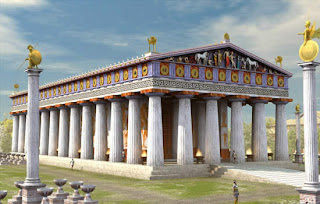The Olympic Games: 2012
Olympia
Olympia, the site of the ancient Olympic Games, is
in the western part of the Peloponnese which, according to Greek mythology, is
the island of "Pelops", the founder of the Olympic Games. Imposing
temples, votive buildings, elaborate shrines and ancient sporting facilities
were combined in a site of unique natural and mystical beauty. Olympia
functioned as a meeting place for worship and other religious and political practices
as early as the 10th century B.C. The central part of Olympia was dominated by
the majestic temple of Zeus, with the temple of Hera parallel to it.
The Games were usually held every four years, or olympiad,
as the unit of time came to be known. During a celebration of the Games, an
Olympic Truce was enacted so that athletes could travel from their countries to
the Games in safety. The prizes for the victors were wreaths of laurel leaves.
The Games became a political tool used by city-states to assert dominance over
their rivals. Politicians would announce political alliances at the Games, and
in times of war, priests would offer sacrifices to the gods for victory. The
Games were also used to help spread Hellenistic culture throughout the
Mediterranean. The Olympics also featured religious celebrations and artistic
competitions. The Statue of Zeus, one of the Seven Wonders of the Ancient World,
was erected at Olympia to preside over the Games, though it no longer stands.
Sculptors and poets would congregate each olympiad to display their works of
art to would-be patrons.
The Games and religion
 |
| Zeus: King of the Gods |
The Olympic Games were closely linked to the
religious festivals of the Great God Zeus, but were not an integral part of a
rite. Indeed, they had a secular character and aimed to show the physical
qualities and evolution of the performances accomplished by young people, as
well as encouraging good relations between the cities of Greece. According to
specialists, the Olympic Games owed their purity and importance to religion.
The oldest myth which
concerns the beginning of the Olympic Games is that of Idaios Daktylos
Herakles. According to other myths, Zeus, the father of humanity, fought and
defeated Cronus in a struggle for the throne of the gods. Finally, the
well-known demigod Herakles is mentioned. He staged games in Olympia in honor
of Zeus, because the latter had helped him conquer Elis when he went to war
against Augeas.
Through the 12 centuries
of the Olympic Games, many wonderful athletes competed in the stadium and the
hippodrome of ancient Olympia's sacred area, moving the crowds with their great
achievements. Although mortal, their Olympic victories immortalized them. Of
the best athletes who left their mark on the sacred valley of Olympia, some
surpassed all limits and became legends by winning in successive Olympic Games
and remaining at the forefront of their sport for more than a decade. It is
worth mentioning some of their extraordinary achievements, which, even by
today's standards, would be the envy of athletes such as Nurmi, Zatopek or
Lewis.
The ancient Olympic Games
were initially a one-day event until 684 BC, when they were extended to three
days. In the 5th century B.C., the Games were extended again to cover five
days.
The ancient Games included running, long jump, shot put, javelin, boxing, pankration and equestrian events.
The ancient Games included running, long jump, shot put, javelin, boxing, pankration and equestrian events.
Participants
All free male Greek
citizens were entitled to participate in the ancient Olympic Games, regardless
of their social status. Orsippos, a general from Megara; Polymnistor, a
shepherd; Diagoras, a member of a royal family from Rhodes; Alexander I, son of
Amyndas and King of Macedonia; and Democritus, a philosopher, were all
participants in the Games.
The athletes usually competed nude, not only as
the weather was appropriate, but also as the festival was meant to celebrate,
in part, the achievements of the human body. Olive oil was used by
the competitors, not only as a substitute for soap for washing, bathing,
and cleaning, but also as a natural cosmetic, to keep skin smooth, and
provide an appealing look for the participants
Married women were not
allowed to participate in, or to watch, the ancient Olympic Games. However,
unmarried women could attend the competition, and the priestess of Demeter,
goddess of fertility, was given a privileged position next to the Stadium
altar.
Sporting Event
Pentathlon
The Pentathlon became an
Olympic sport with the addition of wrestling in 708 B.C., and included the
following:
Running
Running contests included:
- the stade race, which was the pre-eminent test
of speed, covering the Olympia track from one end to the other (200m foot
race),
- the diaulos (two stades - 400m foot race),
- dolichos (ranging between 7 and 24 stades).
Jumping
Athletes used stone or
lead weights called halteres to increase the distance of a jump. They held onto
the weights until the end of their flight, and then jettisoned them backwards.
Discus throw
The discus was originally
made of stone and later of iron, lead or bronze. The technique was very similar
to today's freestyle discus throw.
Wrestling
This was highly valued as
a form of military exercise without weapons. It ended only when one of the
contestants admitted defeat.
Boxing
Boxers wrapped straps
(himantes) around their hands to strengthen their wrists and steady their
fingers. Initially, these straps were soft but, as time progressed, boxers
started using hard leather straps, often causing disfigurement of their
opponent's face.
Pankration
This was a primitive form
of martial art combining wrestling and boxing, and was considered to be one of
the toughest sports. The Ancient version of MMA. Greeks believed that it was founded by Theseus when he
defeated the fierce Minotaur in the labyrinth.
Equestrian events
These included horse races
and chariot races and took place in the Hippodrome, a wide, flat, open space.
Victory Ceremonies
The Olympic victor
received his first awards immediately after the competition. Following the
announcement of the winner's name by the herald, a Hellanodikis (Greek judge)
would place a palm branch in his hands, while the spectators cheered and threw
flowers to him. Red ribbons were tied on his head and hands as a mark of
victory.
The official award
ceremony would take place on the last day of the Games, at the elevated
vestibule of the temple of Zeus. In a loud voice, the herald would announce the
name of the Olympic winner, his father's name, and his homeland. Then, the
Hellanodikis placed the sacred olive tree wreath, or kotinos, on the winner's
head.
 |
| Nike: Goddess of Victory |
Good Luck to ALL Athletes. Win for the honor of your country and the glory of immortal and fame. May Nike shine on you.













Comments
Post a Comment